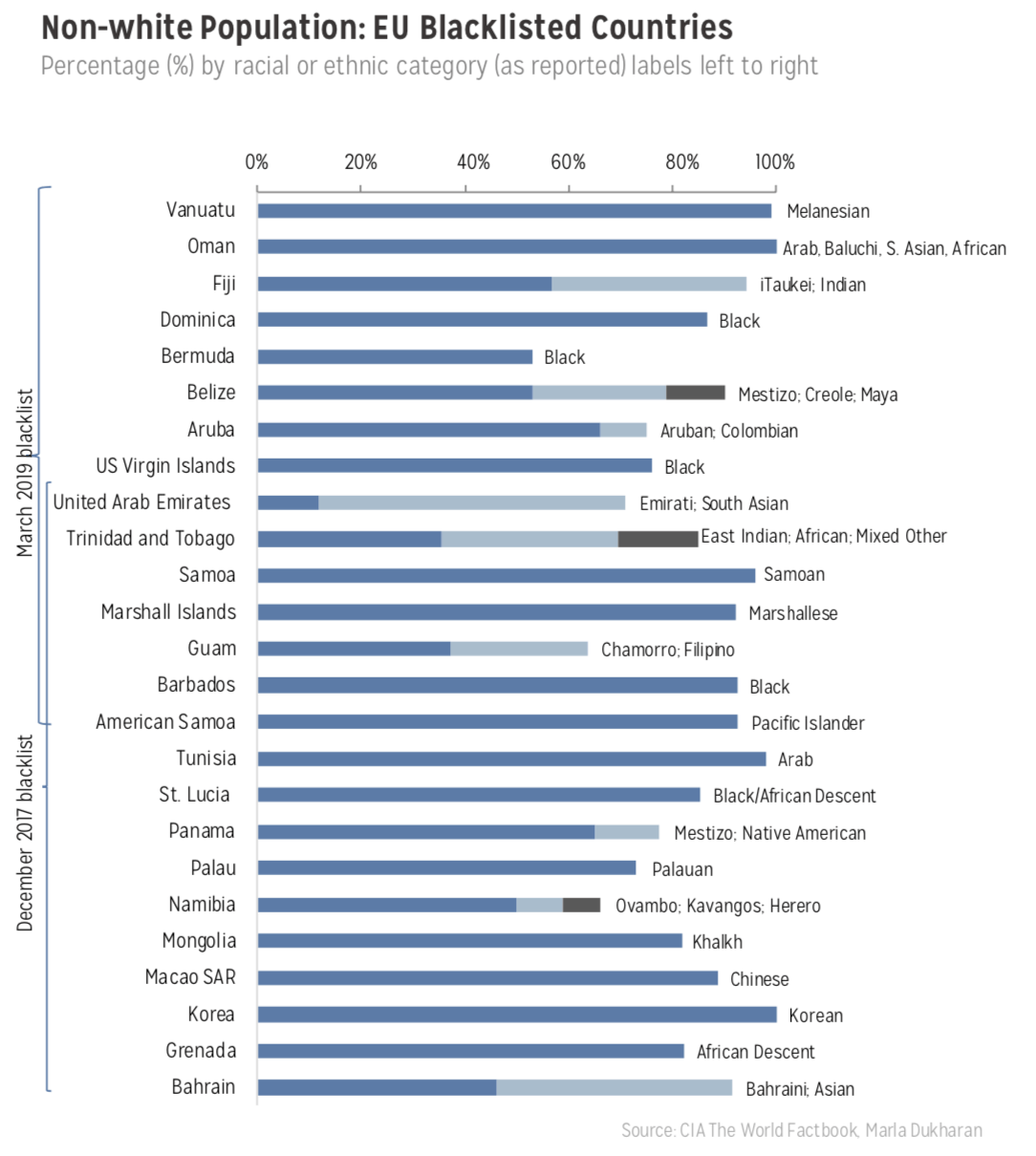
In a post last year: “Diversity of Thought – how much is too much?” I remarked upon a panellist at an event choosing to be present, to listen, then to respond calmly. Within that post I wrote:
“..brings to mind to me a quote from 1770 from the Irish statesman and philosopher Edmund Burke:
“When bad men combine, the good must associate; else they will fall, one by one, an unpitied sacrifice in a contemptible struggle.”
A powerful phrase that has been adjusted and repeated for many years as :
“The only thing necessary for the triumph of evil is that good men do nothing.”
So, today I share with you a recent article from a dear friend of mine, the brilliant, passionate and purpose-driven economist, Marla Dukaharan.
In this, Marla calmly and clearly calls out empirically obvious racist and white supremacist actions against offshore (defining that as “not large countries” though the majority are islands distant to the major economic powers) jurisdictions. For this, I applaud her for taking a stand, for saying something.
Racism and White Supremacy in the UK and beyond
I can imagine some of you already feel that to be an uncomfortable header to read.
it is meant to be. Oh, and to clear something up right away, by white supremacy I do not refer to the overt “KKK” type open behaviour that has, thankfully, become almost a thing of the past. No, I refer to the deeply entrenched and insidious biases that are, I find, typically unconscious, and perhaps even more powerful a force for that.
I’ve found in moving to the UK two years ago that racism is particularly insidious here. People are generally comfortable to talk about issues such as inequality and bias around gender, sexuality and other areas of clear societal and systemic bias. However, when it comes to race, including the exploitative history of the British Empire and the deeply entrenched racial bias in the UK and overseas, the subject makes people very uncomfortable.
WHEN A BLACKLIST IS, UNFORTUNATELY, JUST THAT.
Now, here I repost (with kind permission) an article from March 2019 from Marla Dukharan. First, a summary from her monthly economic report (available for download here), then a section from the full article, normally only open to her premium subscribers, but kindly made available here.
Marla, thank you for calling out this racial bias. I’m so glad you did and I hope it sparks a real and honest conversation with the countries and bodies involved (notably the EU).
The Organization for Economic Co-operation and Development (OECD) established the Global Forum on Transparency and Exchange of Information for Tax Purposes, which now has 154 members and is recognized as the global tax policy authority. Importantly, since 2009, “no jurisdiction is currently listed as an uncooperative tax haven by the Committee on Fiscal Affairs” of the OECD. However, OECD Global Forum peer reviews as at March 2019 lists Anguilla, Sint Maarten, Turkey, Curacao, Ghana and Kazakhstan as “Partially Compliant”, Marshall Islands as “Provisionally Partially Compliant”, and only Trinidad and Tobago as “Non-Compliant”, while the remainder are listed as “Provisionally Largely Compliant”, “Largely Compliant”, or “Compliant” with the OECD’s requirements.
Enter the European Union (EU) whose members are mostly also OECD members. The EU published its first blacklist of 17 countries in December 2017, and updated it in March 2019 to reflect 15 countries, including the OECD’s “Largely Compliant” territories of Aruba, Barbados, Belize and Bermuda. How could this be?
Averaging 22.5%, the EU’s corporate tax rates are higher than the global average of 21.4%, but by the end of 2017, EU countries had accumulated over EUR12.5 trillion in Government debt, at 82% of EU GDP. The EU blacklisted countries on average carry Government debt at 61.3% of GDP – about 20 percentage points lower than the EU average, despite the EU having higher than average corporate tax rates.
According to IMF data for 2018, General Government revenue reached 46% of GDP in the Euro area, but only 26.8% in Emerging Market and Developing Economies, and 26% in Latin America and the Caribbean.
So, the EU is clearly concerned about collecting sufficient fiscal revenue not just to repay its relatively high Government debt, but to finance its high level of fiscal spending.
And finally, the data suggest a particular commonality among the blacklisted countries which is too striking to be dismissed as mere coincidence, or to be ignored – they are ALL predominantly non-white.
{now to add a section from the full article to highlight the racial bias}
According to a 2017 article in the Politico, “There are close to 50 million people of a racial and ethnic minority background living in the EU – about 10% of the bloc’s population.” This means that the vast majority – about 90% – of the EU is, well, white. Furthermore, “the minority population directly employed by EU institutions (stands) at around 1%. The only major international institution in Brussels with a somewhat ethnically diverse staff is NATO: thanks to Turkey and the United States.”
This means that at 1% of employees, minorities are under-represented in the governance and decision- making architecture of the EU, despite accounting for 10% of the population.
Now, let’s look at the ethnic composition of the EU’s blacklists:
Across both the December 2017 EU blacklist of 17 countries and the March 2019 EU blacklist of 15 countries, it’s probably not necessary to point out that the population in EACH country is predominantly non-white.
The EU blacklist has, however, omitted the USA’s and UK’s other low-tax territories, such as the US states of Delaware (69.2% Caucasian) and Nevada (68.1% Caucasian), and British Overseas Territory Gibraltar (Gibraltarian 79%, other British 13.2%). It’s probably not necessary to point out that these US and UK / EU low-tax jurisdictions which were not blacklisted by the EU are, well, predominantly white.
